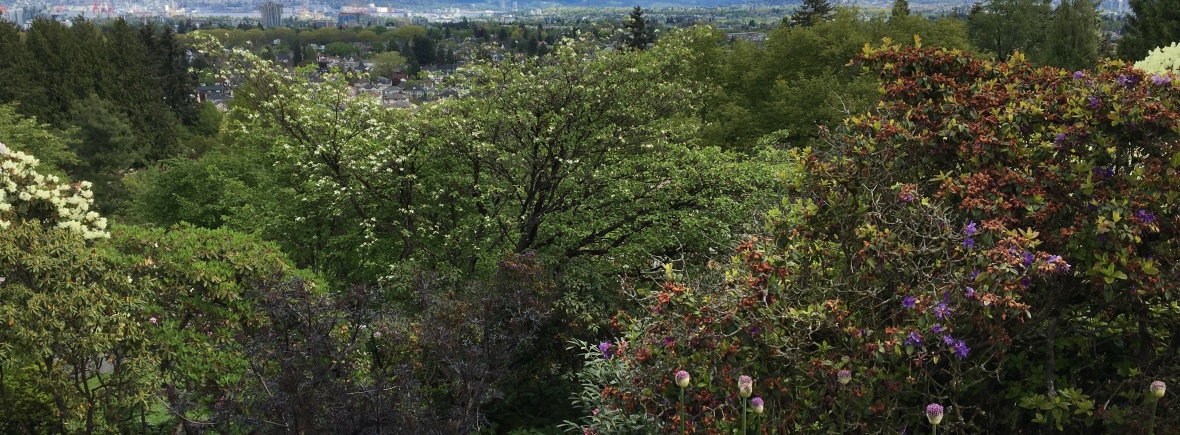- Women’s roles in arboriculture & urban forestry
- Transdisciplinary perspectives in urban forestry
- Historical narratives of urban ecologies and arboriculture
- Political ecology and polarizations in urban forest (sub)cultures
- Pedagogies of space and place related to personal and social identity in higher learning and education
- Constructionism & social psychology of environmental justice and justifications of human behaviour
- Creative influences and representations of urban forests and arboriculture in photography, film & literature
POSTDOCTORAL RESEARCH
Girls Talk Trees: Analyzing and enhancing women’s roles and participation in arboriculture and urban forestry
Affiliation: Faculty of Forestry, Department of Forest Resources Management, University of British Columbia (2018)
Supervisor: Dr. Cecil Konijnendijk van den Bosch
Abstract: Arboriculture and urban forestry are seen to be male-dominated industries. Historically, this was the case being that operations were physical and labour-intensive. Despite the challenges that women have faced in these industries, in recent years, we are seeing more young women embrace opportunities and pursue careers in these fields. Arboriculture and urban forestry are growing fields of research and practice where women’s contributions can be represented, communicated and celebrated more broadly. More research is focusing on gender balance and the diverse communities that comprise both traditional and urban forest sectors. There is also more attention being paid to this area in practical operations and management. The central objectives of this research are to assess the current status of women’s participation in arboriculture and urban forestry, to examine various narratives relating to barriers, experiences, motivations and perspectives of women by women, and to enhance and encourage the participation of women in the arboricultural and urban forestry labour markets. Methods included an online survey of women working in these industries in both Canada and the United States. Questions asked considered: personal experiences, inquiry into employment and leadership, education and certification, marital status, age, income, career history, daily practice, diversity, equality, gender balance, opportunities and challenges. Results yielded from over 500 respondents, provide valuable insight into how women participate in and perceive, influence and engage within the arboricultural and urban forestry workforce.
Citation:
Bardekjian, A., Nesbitt, L., Konijnendijk, C., & Lötter, B. (2019). Women in urban forestry and arboriculture: Experiences, barriers and strategies for leadership. Urban Forestry and Urban Greening, (46).
Film: Women Branching Out: A diversity of careers in arboriculture and urban forestry© is a short independent film, in collaboration with Fleming College in Ontario, celebrating women working in the diverse urban tree industry. Click here to view.
Learning from Limbwalkers: Arborists’ stories in Southern Ontario’s urban forests
Affiliation: Faculty of Environmental Studies, York University (2015)
Committee: Dr. L. Anders Sandberg (Supervisor), Dr. Cecil C. Konijnendijk van den Bosch, Dr. Leesa Fawcett, Dr. Don Dippo
Abstract: Urban forestry (UF) contains dominant stories of adaptive management, ecosystem services, valuation, green infrastructure, planting mandates, and citizen engagement. Inspired by political ecology, this study examines the marginal and under-represented stories related to language, labour processes, human and non-human agency, and educational norms in UF in Southern Ontario, Canada. With a focus on arboricultural practice, I explore how communicating underrepresented narratives informs a more socially inclusive urban forest integration. Methodology uses theoretical reflection, primary and secondary research, and semi-structured interviews, participant observation and site-visits with 50 field arborists and urban foresters. Using phenomenology, political ecology, ethnography and discourse analysis, I examine arborists’: representation in language; working activities and relationships with co-workers; negotiations in the urban forest, physically and emotionally as a place of work; and, feelings about available education versus existing UF and arboriculture programs. Results reveal that: i) language and metaphors surrounding arborists can perpetuate negative perceptions; ii) political climates surrounding UF operations favours male, non-field workers; iii) arborists’ have a physical and emotional relationship with the urban forest; and, iv) lack of standardized comprehensive and inclusive UF education creates knowledge gaps leading to unsafe environments for trees and people. Findings suggest that re-imagining UF practice and communication influences its praxis towards more sustainable, ethical and transdisciplinary directions by: i) raising urban tree worker profiles through accurate terminology in marketing and communications; ii) aligning health and safety policies with field worker perspectives; iii) developing better UF decision-making systems and management practices by understanding arborist perspectives on non-human agency; and, iv) providing a solid baseline of formal education and incorporating critical social theory to better reflect the transdisciplinary aspects of the field. Inspired by Thomas Kuhn’s (1962) notions of how professional fields need paradigm shifts to progress beyond regular or normal avenues, I argue that seeing UF through narratives of lived experience by field workers can better integrate social and ecological considerations in urban forest research, management and education. My research moves beyond existing models of strategic planning, with lessons from the social sciences, by way of critical reflection and participatory learning, offering a new conceptual framework for UF praxis.
Citation:
Bardekjian, A. (2015). Learning From Limbwalkers: Arborists’ Stories in Southern Ontario’s Urban Forests. (Accession No. 10315/30088) [Doctoral dissertation, Faculty of Environmental Studies, York University, Toronto, Ontario]. YorkSpace. Available at: http://hdl.handle.net/10315/30088
Film: Limbwalkers© is a short independent film that sheds insight into the social complexities of working arboriculture. The story explores the connections that field arborists have with the important work they perform, their close relationships with trees, and their voice in broader urban forestry discourses. This film is a tribute to the men and women who nurture our urban trees and maintain our urban forests. Click here to view.







